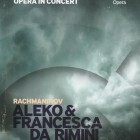Aleko 2018Scottish Opera
Read more about the opera Aleko
Aleko is a work composed when Rachmaninov was a student of nineteen. On that basis there is plenty to enjoy. Like so many Russian operas, the subject is derived from Pushkin, and the librettist was a distinguished man of the theatre. It is therefore difficult to avoid a sense of slight disappointment with the piece itself, which is, to put it mildly, poorly structured. For a work that only lasts fifty minutes, there is simply not enough actual opera. There is an extensive orchestral introduction and a sequence of characterful gypsy dances, as well as choruses, which may set the atmosphere nicely, but they don't leave enough time for the actual drama to develop, and the result seems perfunctory.
Having got that out of the way, there is still a huge amount to enjoy. As might be expected for a student in a competitive environment, Rachmaninov is in distinctly show-off mood. Right from the start there are elements of lovely orchestration and distinctive melody. There is, as yet, little that sounds like the mature composer, however, there are generous tributes to his elders and models, especially Tchaikovsky. There is plenty of good stuff. The chorus of gypsies also has quite a lot to do, and the model here seems to be closer in style to the still under-rated operas of Rimsky-Korsakov.
This leaves little time for the soloists. We have a beautiful bel canto turn from the Old Gypsy, in elegiac mood, recounting how his own wife absconded with another man, leaving him to bring up the baby, Zemfira. We meet Aleko, an incomer, never quite accepted by the tribe, but who marries Zemfira. Then we have the brief encounter of this wife and a young gypsy, their murder by Aleko and a threnody by the old woman, before the father re-appears to send Aleko into exile. He then returns to his previous lonely state.
The actual performance is hard to fault, led by Stuart Stratford and the Orchestra of Scottish Opera on excellent form. Every opportunity to accentuate the drama was grabbed with abandon, and the chorus also contributed handsomely in its folk-inspired sections. Four of the five soloists were native speakers who communicated superbly and also appeared after the interval in Francesca. The title role and Old Gypsy were sung by familiar artists who first appeared in the autumn in the astonishing Fiery Angel performance. Evez Abdulla made an appropriately frustrated and vengeful Aleko. Alexei Tanovitski sang with a lovely mournful tone, and was rather more comfortable with this character than he was as the dominating Inquisitor in the Prokofiev. Newcomers Ekaterina Goncharova and Oleg Dolgov as the ill-fated romantic leads made an excellent impression, though he was sometimes over-forceful. The brief role of the old woman was cast from strength with the ageless Anne-Marie Owens, conveniently on hand to sing Filipyevna in the concurrently running Eugene Onegin.
While it is unlikely that Aleko will be performed with any frequency, it is certainly worth hearing on occasion, and this was about as good a performance as is likely to happen. Following it with another of Rachmaninov's operas, as here, seems a more satisfactory solution than that adopted in 2008 when the Edinburgh Festival and Mariinsky company added a single act from a rare Prokofiev work. That combination didn't really help either opera. Mind you, the instant development in musical identity with the opening bars of Francesca offered a different kind of challenge to the student work.
The 2017/18 season of Scottish Opera
The season opened at the Edinburgh International Festival with a new production of Greek, the modern classic by Mark-Antony Turnage, which had its British premiere at the 1988 Festival. There were further performances in Glasgow in January. The main season began with a welcome and overdue revival of Sir David McVicar's powerful production of La traviata. In the New Year there were fresh stagings of another successful recent piece, Flight (Jonathan Dove) as well as Ariadne auf Naxos and Eugene Onegin. As a follow-up to the four operatic rareties mounted as Sunday concerts in 2016/17, the new subjects were rare Russian operas - Tchaikovsky's Iolanta, Prokofiev's Fiery Angel and a Rachmaninov double bill - Aleko and Francesca da Rimini. The fourth of these concerts was a digest of Russian pieces performed by students from the National Opera Studio under the title From Russia With Love. There was also the regular Highlights tour round the Highlands and Islands, this time in two phases, autumn and spring.
Performance Cast
- Aleko
- Zemfira Aleko's wife
- Young Gypsy
- Old Gypsy Zemfira's father
- Old Gypsy woman

